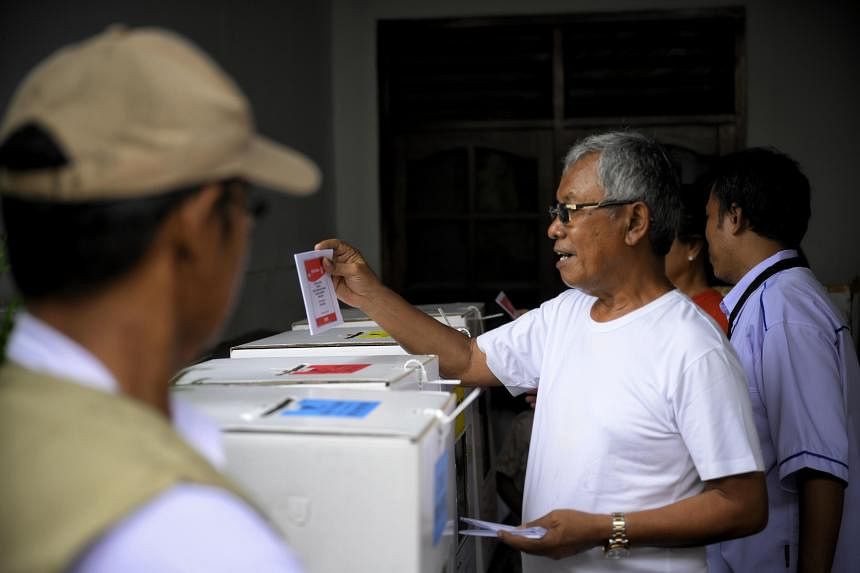Recap: How Indonesia’s polling day unfolded
JAKARTA – Indonesia’s ruling Indonesian Democratic Party of Struggle (PDI-P) is set to retain its position as the biggest party in Parliament, after winning the most number of seats in the Feb 14 legislative election, according to unofficial quick count results.
The PDI-P was fronted by former governor Ganjar Pranowo in the simultaneous Feb 14 presidential election that was won by Mr Prabowo Subianto, the unofficial results showed.
Mr Prabowo’s own party, Gerindra, came in third in the legislative election but is expected to become the lead party for the ruling coalition, named the Onward Indonesia Coalition.
Gerindra’s legislative votes did not mirror Mr Prabowo’s exceptional vote gains in the presidential election.
Under Indonesia’s parliamentary system, political parties that back the winning presidential candidate would automatically become a member of the ruling coalition in the 580-strong Parliament.
Golkar – which is projected to win the second-biggest number of seats in Parliament – is also a member of Mr Prabowo’s coalition.
The other members are the Democratic Party, the National Mandate Party (PAN) and other smaller parties.
Most laws are passed either by consensus or a simple majority of MPs. A president with more MPs supporting him would thus be able to push through new policies and reforms more quickly, including getting new laws and spending plans approved.
It remains unclear whether the PDI-P, which was the lead party in Parliament under President Joko Widodo, will be in the opposition. The PDI-P is led by Ms Megawati Sukarnoputri, the daughter of Indonesia’s founding president, Sukarno.
Under Mr Widodo’s administration, 471 MPs – or 82 per cent of the 575 lawmakers – were from the political parties in the coalition that supported him. The remaining MPs represented the opposition camp.
Still, things could change. The outgoing government led by Mr Widodo managed to persuade once-opposition party, PAN, to join its coalition in 2021.
The PDI-P has not issued a statement on the quick count results of the legislative election.
As many as 9,917 candidates from 18 parties vied for the 580 parliamentary seats. This was five more than the 575 seats contested in the 2019 elections, to accommodate four new provinces in the easternmost region of Papua. Indonesia currently has 38 provinces.
According to quick count results by three independent pollsters for the Feb 14 polls, the PDI-P captured 16 per cent to 18 per cent of the overall vote, based on about 45 per cent to 54 per cent of the sample ballot data. How this will translate into the number of seats in Parliament will depend on which electoral areas PDI-P garnered its votes from.
Under Indonesian election law, less populated islands such as Sumatra and Kalimantan have higher electoral weighting, meaning a smaller number of legislative votes is required from these areas to get one parliamentary seat, in comparison to the most populated island, Java.
PDI-P currently has 128 seats in Parliament.
Gerindra secured around 13 per cent of the total votes despite Mr Prabowo’s lead in the presidential race, based on the quick count so far.
The party currently has 78 MPs.
Political parties or a coalition of parties that secure 20 per cent of the legislative votes in 2024 will be able to nominate presidential and vice-presidential candidates in the next election.
In the three-way 2024 presidential race, PDI-P was the only single party that met this threshold.
Mr Anies Baswedan was nominated by a NasDem party-led alliance.

